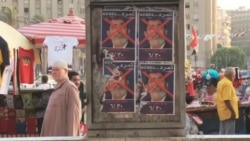CAIRO —
Egypt's media have moved, almost as one, to back the military-led government. While press freedom groups have condemned the stifling of a free media, some defend the one-sided coverage as key to Egypt's "war on terror."
Egyptian state television offers constant reminders that the nation is at war, running the banner “Egypt Fights Terror” in an endless cycle. And there are few battlegrounds as contested as the media itself.
Since the July ouster of Islamist President Mohamed Morsi, stations sympathetic to him have been shut down. Reporters have been arrested and others driven underground.
Press freedom groups decry what Reporters Without Borders calls a “clear hostility towards media that fail to sing the army’s praises.” But some long-time champions of free speech see the need.
Political Sociologist Said Sadek of the American University in Cairo says, “There are moments in history when human rights and freedom of expression and media, they have to take a pause unfortunately. This is a political reality, not political illusions.”
Sadek is among many who say national salvation is now at stake. But military attempts to curry favor in the media were evident even before the coup. A leaked video shows military chief General Abdel Fattah el-Sissi earlier this year discussing ways to influence key media figures, with Sissi asking how the military can “intimidate” them.
While critics point to military strong-arming, there appears to be genuine support for a monolithic voice. Sadek says the dissenting reports of the foreign media - seen as supporting the Muslim Brotherhood and their protests - are a problem.
“Some of the journalists who came to Cairo, you know, are so romanticizing: 'Oh this is pro-people,'" he said.
Their reports ignored the calls to violence and other hate speech of some Islamist media, he says.
Whatever the justification for the pro-military tilt and the suppression of free press, the pitfalls are clear. Professor Christian Donath of the American University in Cairo says the demonizing of the Muslim Brotherhood may have short term advantages, but does not bode well for the future.
“The problem with the kind of language they use makes it more difficult to conduct negotiations in the future with the Brotherhood and its supporters," said Donath. "And it is difficult to see how Egypt is going to return to the kind of stability that the government is calling for, the average people in the street want, without some sort of reconciliation.”
But with journalists avoiding arrest by showing only the military's side of the story, a more balanced view seems a long way away.
Egyptian state television offers constant reminders that the nation is at war, running the banner “Egypt Fights Terror” in an endless cycle. And there are few battlegrounds as contested as the media itself.
Since the July ouster of Islamist President Mohamed Morsi, stations sympathetic to him have been shut down. Reporters have been arrested and others driven underground.
Press freedom groups decry what Reporters Without Borders calls a “clear hostility towards media that fail to sing the army’s praises.” But some long-time champions of free speech see the need.
Political Sociologist Said Sadek of the American University in Cairo says, “There are moments in history when human rights and freedom of expression and media, they have to take a pause unfortunately. This is a political reality, not political illusions.”
Sadek is among many who say national salvation is now at stake. But military attempts to curry favor in the media were evident even before the coup. A leaked video shows military chief General Abdel Fattah el-Sissi earlier this year discussing ways to influence key media figures, with Sissi asking how the military can “intimidate” them.
While critics point to military strong-arming, there appears to be genuine support for a monolithic voice. Sadek says the dissenting reports of the foreign media - seen as supporting the Muslim Brotherhood and their protests - are a problem.
“Some of the journalists who came to Cairo, you know, are so romanticizing: 'Oh this is pro-people,'" he said.
Their reports ignored the calls to violence and other hate speech of some Islamist media, he says.
Whatever the justification for the pro-military tilt and the suppression of free press, the pitfalls are clear. Professor Christian Donath of the American University in Cairo says the demonizing of the Muslim Brotherhood may have short term advantages, but does not bode well for the future.
“The problem with the kind of language they use makes it more difficult to conduct negotiations in the future with the Brotherhood and its supporters," said Donath. "And it is difficult to see how Egypt is going to return to the kind of stability that the government is calling for, the average people in the street want, without some sort of reconciliation.”
But with journalists avoiding arrest by showing only the military's side of the story, a more balanced view seems a long way away.





